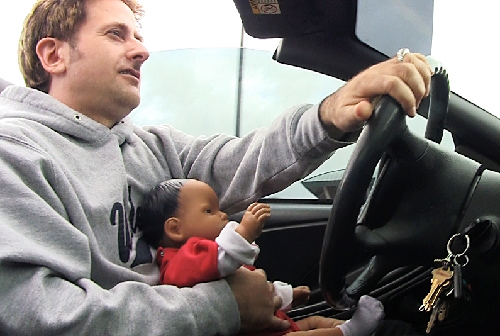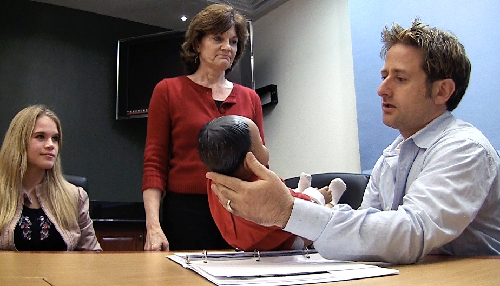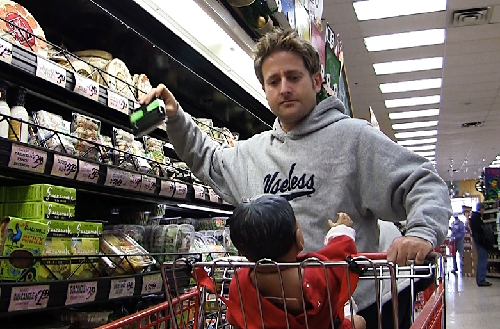Soon-to-be dad adopts a baby simulator (Simulated Dad)
I'm due for first-time fatherhood next month, and my wife is concerned. I leave drawers open. I curse. I have been known to forget to feed and walk our dog.
Most significantly, I'm still a baby myself. How will I react to another one horning in on the attention?
Baby Think It Over is a $350 infant simulator designed to test parenting skills. The modern-day equivalent of a sack of sugar, it looks and feels like an 8-month-old. It also cries like one, until a magnet is inserted into a circular slot in its back. The magnet must be held there for 20 minutes at a time (a feeding session).
Baby Think It Over is distributed to Clark County School District students who volunteer for extra credit in select health classes. (According to a 2010 report by the Guttmacher Institute, Nevada trails only New Mexico in its teenage pregnancy rate: 90 per 1,000 females ages 15-19.)
"With my teenagers, what we're trying to do is make them think of how hard it would be to have a baby," says Janet Michelin, health teacher at the Las Vegas Academy of Performing Arts, who loaned me one named Sim.
A microprocessor locked inside Sim behaves just like my mother. It records only the things I do wrong, in precise detail. All will be reported back to Michelin after the weekend is through.
"Waaaa! Waaaa! Waaaa!"
Five minutes after I activate Sim after work on Friday, he begins interfering with my life. I insert the magnet, he stops crying, and my wife and I continue walking into her office Christmas party; she carrying my real baby, me my simulated one. (Jo Ann is under doctor's orders not to drive, so I had to. And a doll sitter -- funny as that would have been -- was out of the question. The magnet is attached to my wrist by a snap-on bracelet that must be cut off to be removed. And any student who does that fails the test.)
But just because the doll stops crying doesn't mean it has stopped feeding. Like real babies, simulated ones come with no instructions, and students aren't meant to realize -- at least not at first -- that a cooing sound is the signal that the magnet can be removed. Otherwise, within a few minutes, the digital sound storm stirs anew.
Neither crying nor cooing is easy to hear inside the Red Rock Lanes bowling alley, where Jo Ann's office party is taking place.
"Is that yours?" asks the 10-year-old daughter of one of Jo Ann's co-workers. "Can I hold it?"
I beam while handing over Sim, who is crying without my knowing it.
The crying isn't the most insidious part of my first night with Sim, by the way. It's the not crying. Before midnight, his fits came like a three-hour snooze button (pushed on the most annoying alarm a human can ever choose). I kind of prepared myself to handle that.
But 3 a.m. has come and gone with no crying. Are the batteries dead? Is my clock fast? Should I bother trying to fall back to sleep, only to be awoken in two minutes?
Turns out, Sim only goes off every three hours sometimes. Other times, he waits as long as four hours, or he goes no longer than a half-hour. (Come on, guys, you mean to tell me that real babies are actually unpredictable?)
In addition, as it was not fun to discover, his magnet doesn't stay inserted easily. So the shortcut I thought I invented -- balancing Sim like a tray of drinks on my wrist while I lie face up in bed -- doesn't work for long. Neither does placing him on his stomach. (He cries, to discourage sudden infant death syndrome.)
The next morning, Sim throws me off my daily physical fitness regimen. (OK, weekly.) I can't jog. Nor can I work out. (The nice man at the Las Vegas Athletic Club day care center informs me that, in order to be dropped off there, babies have to be at least 6 weeks old "and breathing.")
Two weeks ago, Codie Gardner, 15, adopted one of Michelin's six Baby Think It Over dolls and suffered a crying fit to rival the doll's.
"I just got so frustrated, and it was so much more difficult because I was so upset," Gardner says. "It made me be like, 'I don't want this anytime soon.' "
And baby simulators let you off easily. There's no pee, no poop, no spit-up. You don't need to buy $5 bottles of organic strained carrots or send it to college. And, in the most significant way a vinyl baby differs from a flesh one, you get to give it back after a weekend and get some sleep.
"Let me read that again," Michelin says.
It is now Monday morning, and Michelin stares at the results flashing on a screen inside Sim's back. She's not sure how to tell me. I've scored four mishandles, three neglects and 31 minutes of crying time. (This is not good. Gardner, for instance, scored no mishandles or neglects and eight minutes of crying time.)
"I don't know about the mishandles," she says. "That bothers me."
Perhaps the simulator must be broken, I try explaining. Or perhaps there were some teensy lapses in judgment. (Handing Sim over to the daughter of my wife's co-worker was my first. She proceeded to shake him like a clogged red pepper dispenser.)
As for the crying, Michelin's students don't drive, so they're never forced to choose between scoring a low amount of crying time or resurfacing the I-215 in their own bodily fluids. (Besides, most modern baby books tell you to largely ignore your child's crying, if you can, and I could.)
And what about all the good things I did over the weekend that Sim's readout doesn't register? I took him to a playground for some slide fun, to the Yard House Bar & Grill for dinner, to the pool table at Red Rock Lanes for a game.
"I'm sure all that is true," says Michelin, who appears to be searching for the number to Clark County Child Protective Services.
OK, so I'm a failure as a simulated dad. But does this really predict what kind of real dad I'll be?
I don't think so. With a simulator, there also are no rewards to get you through the hell. No smiles, no warm cuddles, no free baby registry gifts. And you can't use the HOV lane.
Plus, once our real baby arrives, I can always unload her on my wife.
To see the video, check out lvrj.com/simulator. Levitan's previous columns and videos are posted at fearandloafing.com. Fear and Loafing runs on the first Sunday of every month in the Living section. If you have a Fear and Loafing idea, e-mail clevitan@reviewjournal.com or call (702) 383-0456.
Corey takes on a simulated baby






























